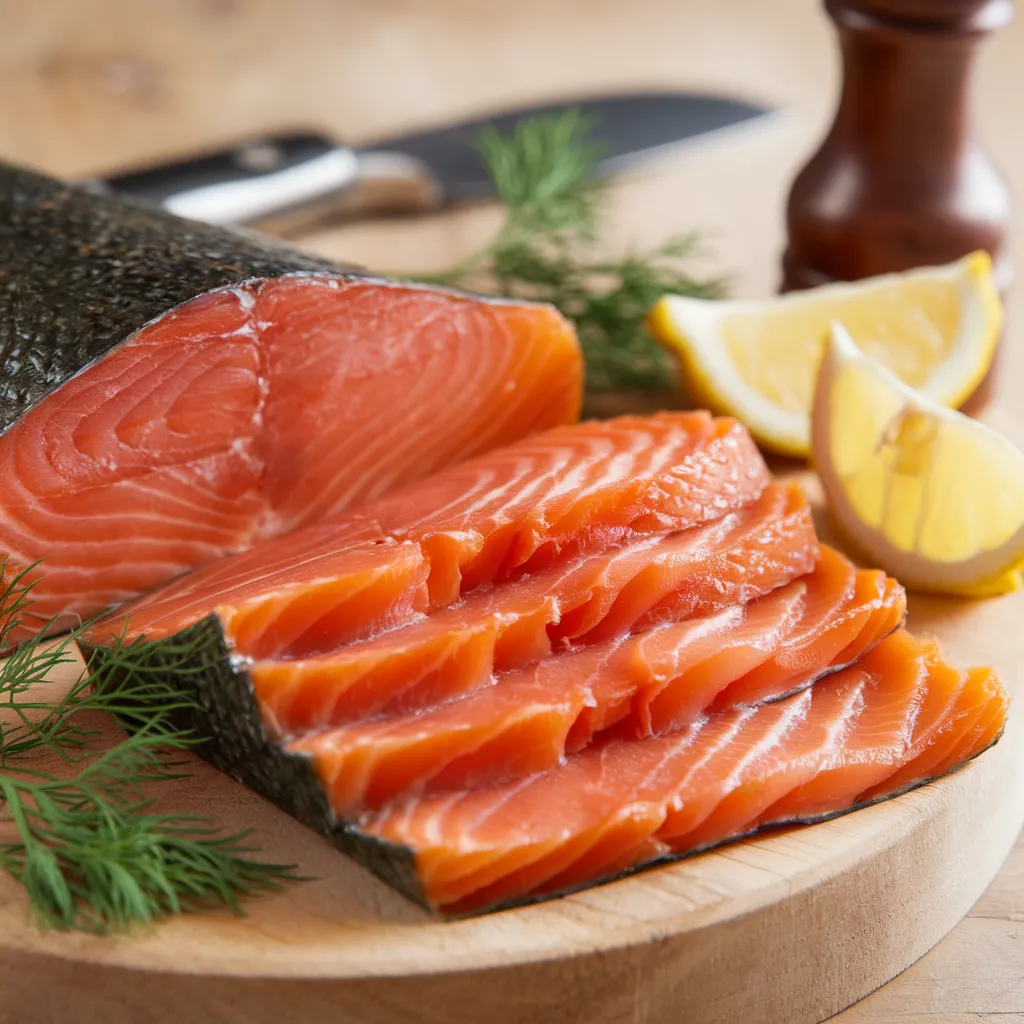Is Smoked Salmon Healthy?
Smoked salmon is a popular choice in many cuisines. You’ll often find it on bagels, in salads, or as a topping for appetizers. But is smoked salmon truly healthy? In this article, we’ll explore its nutritional benefits, risks, and how to incorporate it safely into your diet.
Nutritional Value of Smoked Salmon
Smoked salmon is packed with nutrients. One of its key benefits is its high protein content. Protein is vital for muscle growth and repair. This makes smoked salmon a great option for athletes or anyone trying to build or maintain muscle.
Another major health benefit is its Omega-3 fatty acids. These healthy fats are crucial for heart health and reducing inflammation. Omega-3s have been shown to lower triglycerides and reduce the risk of heart disease.
Key nutrients in smoked salmon include:
- Vitamin B12: Supports red blood cell production and helps maintain a healthy nervous system.
- Vitamin D: Helps your body absorb calcium and supports bone health.
- Selenium: A powerful antioxidant that protects your cells from damage.
- Magnesium: Important for muscle and nerve function.
However, smoked salmon also has a downside — its high sodium content. The curing process adds salt, which may cause problems for people watching their sodium intake. If you’re curious about how other foods affect health, you can learn more about sourdough discard’s benefits.
Heart Health Benefits of Smoked Salmon
One of the biggest reasons people choose smoked salmon is for its heart-healthy Omega-3 fatty acids. These fats offer many heart benefits:
- Reduce inflammation throughout the body, which lowers the risk of chronic diseases, including heart disease.
- Lower triglyceride levels. High levels of these blood fats can increase your risk of heart disease.
- Lower blood pressure. By helping your blood vessels relax, Omega-3s reduce the likelihood of heart attacks and strokes.
A diet rich in Omega-3s can lower your risk of cardiovascular disease. In addition to improving heart health, Omega-3s can also help with brain function. They may improve cognitive performance and reduce the risk of conditions like Alzheimer’s disease. Interested in cooking ideas with smoked salmon? Check out these smoked salmon recipes.
Bone and Muscle Health
Smoked salmon’s high protein content supports muscle repair and growth. Protein is essential for anyone looking to build muscle, but it’s also important for maintaining muscle mass as you age.
The Vitamin D in smoked salmon is equally important. Vitamin D helps your body absorb calcium, a mineral crucial for strong bones. A diet rich in Vitamin D can help prevent conditions like osteoporosis. Smoked salmon also contains magnesium, which supports muscle and nerve function, helping to prevent muscle cramps.
If you’re looking for more ways to enjoy smoked salmon, try these smoked salmon recipes for healthy meal ideas.

Skin Health and Anti-Aging Benefits
Smoked salmon doesn’t just benefit your heart and muscles; it’s also good for your skin. The Omega-3 fatty acids in salmon help reduce inflammation, which can keep your skin looking young and healthy. These healthy fats also maintain your skin’s elasticity, helping to prevent wrinkles.
Omega-3s play an important role in keeping the skin hydrated, reducing dryness, and improving overall skin texture. Smoked salmon also contains antioxidants, like selenium, which protect your skin from damage caused by UV rays and environmental stress.
By adding smoked salmon to your diet, you can help your skin stay youthful and glowing. The antioxidants in salmon reduce the effects of aging, making it a great anti-aging food.
Potential Risks of Eating Smoked Salmon
While smoked salmon is packed with health benefits, it’s important to consider its potential risks. The high sodium content and the processing methods can have downsides, especially if you eat smoked salmon too often.
High Sodium Content
Smoked salmon contains a lot of sodium. A single 3-ounce serving can have as much as 600 milligrams of sodium, which is about 25% of the recommended daily limit. Too much sodium in your diet can lead to high blood pressure, increasing your risk of heart disease and stroke.
For people with hypertension or those on low-sodium diets, it’s important to eat smoked salmon in moderation. Balancing your diet with lower-sodium foods can help mitigate the risk. If you want to learn more about how sodium affects your health, check out this guide on sodium in smoked salmon.
Cancer Risks from Processed Foods
Because smoked salmon is a processed food, it contains chemicals like nitrates and nitrites. These substances are added during the smoking and curing process. Research has linked nitrates and nitrites to an increased risk of cancer, especially when consumed in large amounts.
Smoked salmon may contain fewer harmful chemicals than other processed meats, but it’s still wise to limit your intake. Balance your diet with plenty of fresh fruits, vegetables, and whole grains to reduce your overall cancer risk.
Mercury and Environmental Toxins
Like other fish, salmon can contain mercury and other environmental toxins. These toxins are generally found in low amounts in salmon, but they can accumulate in your body over time if you eat a lot of fish.
Pregnant women, young children, and individuals sensitive to mercury should limit their smoked salmon consumption. Stick to a few servings a week to enjoy the benefits without the risk of mercury buildup.
Listeria and Food Safety
Cold-smoked salmon can carry Listeria, a harmful bacteria. This bacteria is especially dangerous for pregnant women, older adults, and people with weakened immune systems. Listeria contamination can lead to serious illness, making it essential to handle and store smoked salmon properly.
Keep smoked salmon refrigerated, and be sure to eat it before its expiration date. For added safety, opt for hot-smoked salmon. The high heat used in the smoking process kills most bacteria, making it safer than cold-smoked varieties.
Who Should Limit or Avoid Smoked Salmon?
While smoked salmon is nutritious, some people should limit or avoid it due to its sodium content and food safety risks.
- Individuals with high blood pressure: The high sodium content in smoked salmon can worsen hypertension.
- Pregnant women: Because of the risk of Listeria, pregnant women should avoid cold-smoked salmon unless it’s cooked thoroughly.
- People on low-sodium diets: Those with heart disease, kidney disease, or other conditions requiring reduced sodium intake should monitor how much smoked salmon they eat.
- People with a history of cancer: Since smoked salmon is a processed food, it contains chemicals linked to cancer. Limiting consumption may help lower the risk.
FAQs About Smoked Salmon
Is Smoked Salmon Good for Weight Loss?
Yes, smoked salmon can be a helpful part of a weight-loss diet. It is low in calories and high in protein, making it a great option for people looking to lose weight. Protein helps you feel full, which can reduce overeating and snacking throughout the day.
How Often Should You Eat Smoked Salmon?
While smoked salmon is healthy, moderation is key. Due to its sodium content and the risks associated with processed foods, it’s best to enjoy smoked salmon once or twice a week. This allows you to benefit from its nutrients without overloading on sodium or processed ingredients.
Does Smoked Salmon Contain Omega-3?
Yes, smoked salmon is a rich source of Omega-3 fatty acids. These fats are essential for heart health, brain function, and reducing inflammation. Omega-3s can also lower cholesterol and support overall cardiovascular health.
Is Smoked Salmon Processed Food?
Yes, smoked salmon is a processed food because it undergoes a smoking and curing process. This process enhances flavor and preserves the fish, but it also adds sodium and nitrates. While smoked salmon is more nutritious than many processed meats, it’s still important to enjoy it in moderation.
Conclusion
In summary, smoked salmon is a nutritious food that offers several health benefits. It supports heart health, muscle growth, and skin vitality. Its high protein and Omega-3 content make it a great addition to a balanced diet. However, its high sodium content and the risks linked to processed foods mean that it should be consumed in moderation.
By eating smoked salmon responsibly — a few times a week — and balancing it with fresh, whole foods, you can enjoy its benefits while minimizing potential risks. If you’re looking for new ways to prepare smoked salmon, check out this guide on smoked salmon preparation.
Smoked salmon can be a delicious and healthy part of your diet, as long as you keep an eye on portion sizes and sodium intake. Pair it with nutrient-dense, whole foods to create balanced meals that support your overall health.





